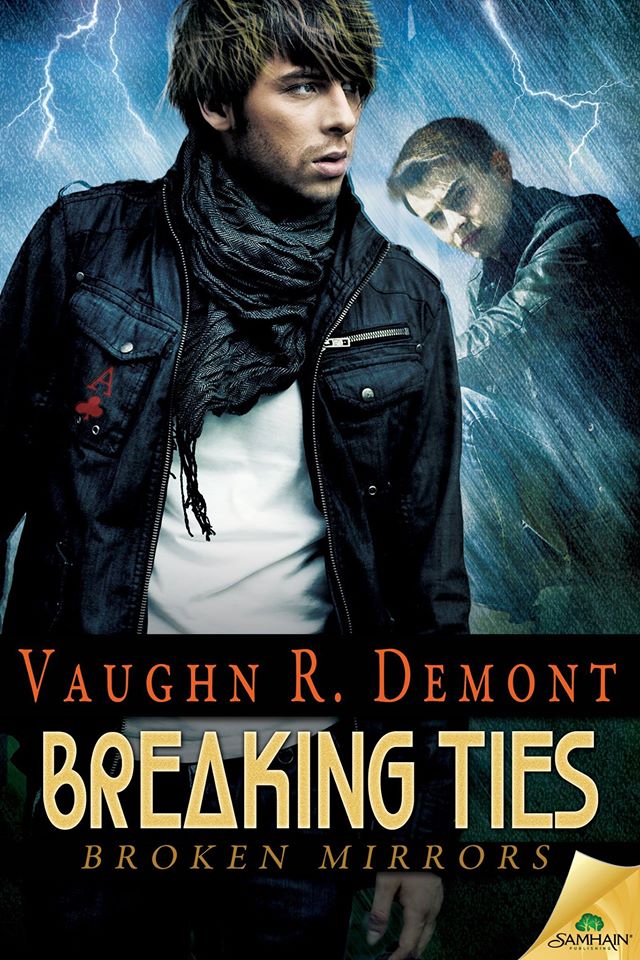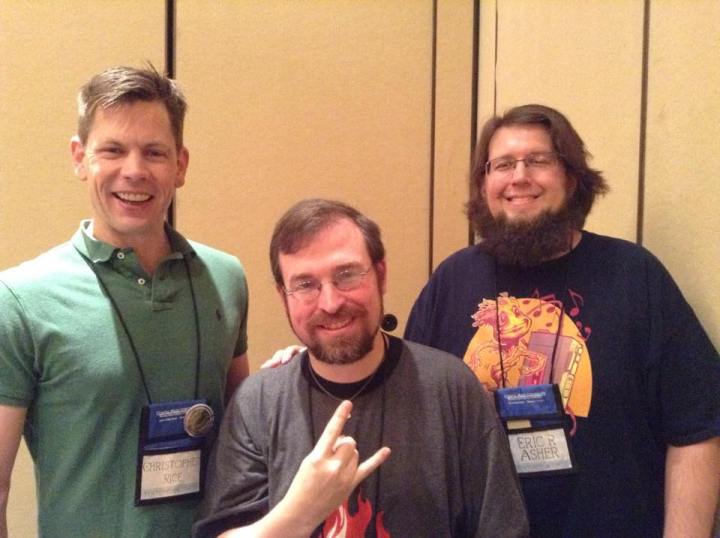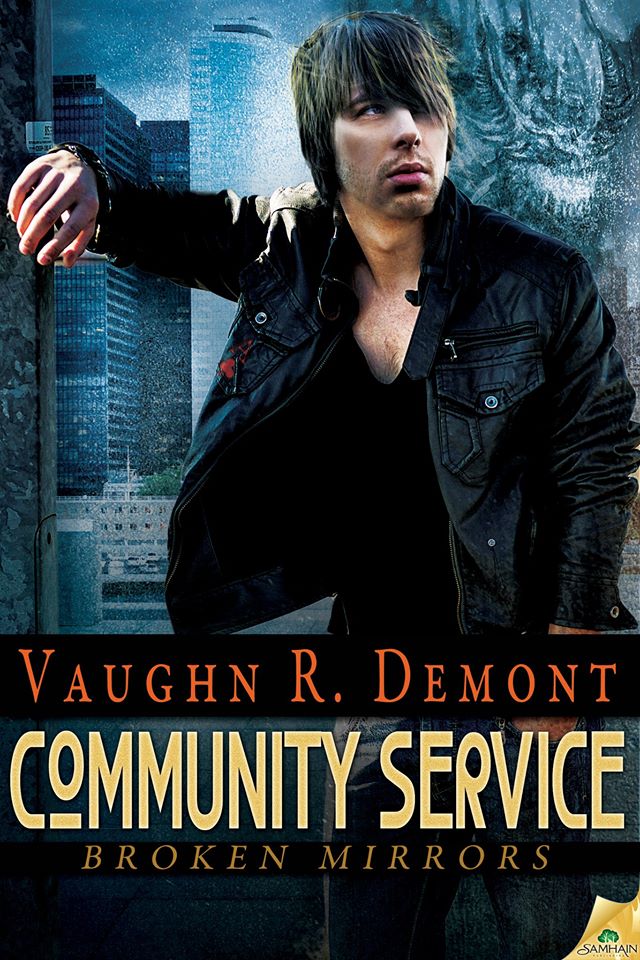Recently I had the opportunity to meet and connect with author Vaughn R. Demont. A talented writer and an all-around very cool guy, I was more than stoked when he agreed to sit down for this interview where we cover everything from life as a gay geek, being an urban fantasy author and of course diversity in speculative media.
Upkins: For the readers at home, tell us a bit about yourself.
Demont: It’s always weird to answer this question. Do I recite the same tired thing in my bio? Go humble, be brash? I’m a gay guy, pretty much, from central New York. I’m a gamer, tabletop and PC, I teach composition, and I write urban fantasy because I love the genre and the kind of heroes it enables writing about. I would mention that I run as well but Haruki Murakami does it too and wrote that book and now it seems every writer is humble-bragging about their distance AND their word count on Twitter.
Upkins: Has storytelling always been your calling?
Demont: I’m a tabletop gamer, cut my teeth on Dungeons and Dragons, but it seemed there was never enough attention to what made the characters tick. I end up coming with backstories for every character I play, and if one’s provided, I fill in the blanks. I do this even when it doesn’t make any sense, like when creating a player in the baseball or football game, my brain starts imagining what motivated him to go pro. Who does that? It makes me a lot more invested, more likely to see a game all the way through, and usually end up disappointed by the ending because it wouldn’t match the story I’d built up in my head.

Upkins: Do you remember when you “first” discovered writing?
Demont: It wasn’t until fifth grade, I think. There was a writing prompt about finding a secret door in your basement and writing about where it led. I was really into the Teenage Mutant Ninja Turtles at the time (5th grade remember), so I just wrote and wrote and wrote and ended up with a truly awful piece of fanfiction. But still, from then on, I looked forward to every creative writing exercise and relished the opportunity. In high school I remember filling up a pile of one-subject notebooks with a fantasy novel that looking back was very, very trite, but it got me through some rough times. I think what hooked me on it wasn’t that I got to be creative, but that I got to decide what I was writing about. All throughout school you’re told exactly what to write about and exactly how it’s to be written. Creative assignments were the only time I was allowed any agency, it felt like. I held onto that and try to incorporate it into my pedagogy, giving my students agency as well, letting them write what they care about. I end up with much better papers that way, because I think agency is just as important as creativity.
Upkins: How did your first novel become a reality?
Demont: My first novel was Lightning Rod, actually, even though it was my third published. I wrote it as my creative thesis for my MFA from Goddard, and the first draft ended up a Frankensteinian 380 page behemoth. Honestly, I wasn’t writing it for a degree, or even to get it published. Lightning Rod is the story of a survivor of an abusive relationship, because that’s what I am, and the book was, in a sense, an exorcism of the man who had hurt me. I think it was a way of coping/avoidance, a way of taking what happened to me and turning into just another story I wrote. When it was rejected initially by Samhain, I didn’t blame them, but I undertook an effort to rewrite it all from scratch, leaner and without the scenes and characters that existed solely to impress my professors. Even though I’d sold two books already, reading the acceptance letter for Lightning Rod was one of them most vindicating experiences of my life.
Upkins: Who would you consider to be your writing mentors and influences?
Demont: Rachel Pollack, definitely, as she was my primary advisor and guided Lightning Rod to its end, but also because she showed me that you can write someone LGBTIQA+ and have them be a hero, not a romantic lead, but a true hero. She introduced the first transgender superhero, Coagula from Doom Patrol, and routinely writes LGBTIQA+ characters in her stories. Honestly, most of my influence comes from television and TV plotting, so of course Joss Whedon’s in there, as well as Simon Pegg, Tina Fey, and god I can’t count how many times I’ve watched Ugly Betty, so Silvio Horta has to be in there too. Joss is an influence because the Buffyverse is a seminal work of urban fantasy, but Simon, Tina, and Silvio showed me how to think about interpersonal relationships between family members, and how two characters can be friends without needing romantic entanglement.
Upkins: How long have you been writing professionally?
Demont: I’ve been writing since 2008, when I sold the first chapter of The Last Paladin to Torquere Press. I moved to Samhain afterwards, but the writing’s been sporadic with the teaching job.

Upkins: Do you have a writing ritual or process?
Demont: Normally, I load up whatever music “feels” like the character I’m writing, but I usually type on my laptop and deny myself access to the WiFi until I’ve hit my goal for the day. I used to write at night until 2am, but that ended quickly once I got a day job. Now I try to write in the mornings when I can. When I finish a draft my brain won’t let start on a new project until I write some horrifically bad junk writing to purge everything from my system. Often though, that junk writing ends up better than I thought it would and get shelved as a project for a later date, and that shelf is creaking under it’s own weight now.
Upkins: You have a couple of series out. Tell us about them.
Demont: The Last Paladin was my first series, and it was written for a press that, let’s face it, was for M/M romance/porn. There was a lot I wanted to do with the plot, but there had to be a certain amount of erotic content. Whenever I was writing it I just kept flashing back to that scene in Boogie Nights where Burt Reynolds wished he could make a porno where the audience would stay for the rest of the movie even after they had gotten off. The rights eventually reverted back to me, so I bundled them up and released them for free on my website.
Broken Mirrors, on the other hand, was an opportunity to really play around in my setting, as Samhain only required there be some sort of romantic pairing, but otherwise I had free reign. I’d been watching Spaced again, some Joss Whedon, so I decided to make protagonist whose entire paradigm was based on popular culture, cinema, and television tropes. It was one of the easiest books I ever wrote and I just kept running with it. I was about 30k words into Wayward Son, the fifth book, when I found out that Samhain was closing. I kind of panicked at first, because I had no idea what to do. I love writing the series, because features a gay man and a bisexual man who save the world first, and worry about whatever relationship they’re in second. Priorities, you know?

Upkins: #OscarsSoWhite, #WeNeedDiverseBooks, The Hugos, all examples of diversity or the lack thereof. As a queer white male author, what are your thoughts on these controversies?
Demont: It’s starting conversations that need to be had and encouraging actions that need to be taken if we’re going to move in the right direction, that’s my thoughts as a queer author. As a white male? I’m going to shut the fuck up and listen to the people who finally are being heard, and try to figure out what I can do.
Upkins: As a marginalized author, what has been your experience working in the speculative fiction field?
Demont: The greatest challenge, I’ve found, is not being shelved as romance simply because your hero is GLBTIQA+, and there’s not much you can do to alleviate it. Readers are going to see your book how they choose to see your book no matter how you tag it on Amazon. Broken Mirrors is urban fantasy, but I still get e-mails telling me that Spencer should end up back with Rourke because of all the sex they had. Gay and bisexual cis and trans men are too often seen as walking glands unless they’re dying of AIDS or living through a private hell of persecution that will inevitably result in getting beaten half to death by dudebros. If you’re writing a gay or bi guy, it seems you have to put him in a relationship with another guy, otherwise he won’t be seen as gay or bi, and more importantly, won’t sell. Why is that?
Also, I’ve learned that I absolutely hate the term, “Smexy.”

From left: Christopher Rice, Vaughn Demont and Eric Asher
Upkins: You wrote a brilliant essay entitled Why I Write Urban Fantasy Instead of M/M. What inspired you to pen it?
Demont: I had just finished The Steel Remains, and I hated it. Like, Harlan Ellis throwing Dhalgren against the wall hated it. It was just the protagonist being called a faggot by everyone almost every other page and him screwing anyone with a dick and a heartbeat, then I thought on the scene from Jim Butcher’s Cold Days where he takes two full pages to explain why Harry Dresden is totally cool with gay people, and then I saw someone refer to Lightning Rod as “M/M Romance”, and that was it. There were quite a few profanities involved, I’m ashamed to say, but I sat down and wrote the essay in a couple of hours. I posted it, and was pretty much terrified afterward, because M/M is a rather monolithic institution when you’re writing gay characters. You live in fear that you’re going to offend the women that are going to read you and review you. It’s funny, you know? I’m afraid some straight guy might kick my ass offline, but online? All he can do is send me hate mail (and I do get that). Women? They’re the people I feel safe with offline, but online? I always feel I’ve got to pick my words, censor what I say, when all I want to do is ask them, “if straight men objectify lesbians, and they do, because they want to see them fuck, aren’t straight women doing the same thing with M/M romance? Is it different because it’s written in a book instead of streamed off Porntube?”
Upkins: What’s been the reaction to the piece?
Demont: Honestly? I’d mostly forgotten about it until you linked it in your essay. My blog’s pretty obscure, most of the web traffic it gets is for a “guide to dating a Scorpio” I wrote for my fiancé to help him understand what he was getting into. Most of the comments were from women saying, “Yeah, we’re still cool with you, you write what you want to write.” It helped me get past a lot of idiot notions I’d been holding onto. There was also a reaction from another publisher telling me, “We NEVER make our writers shoehorn sex scenes,” but I don’t know if it was disagreeing with the statement, or telling everyone “Well OUR press doesn’t do that! #NotAllMMPublishers” I don’t know about that particular press, but it does happen.
Upkins: What’s been your most surprising experience as an author?
Demont: I went to Coastal Magic 2015, my first convention I was attending as an author. I met some cool people, got some pictures, but the entire reason I went down? I proposed to my boyfriend at sunset, and the proposal was littered with references to Legend of Korra and written in the same meter and rhythm as “Let Me Drive My Van into Your Heart” from Steven Universe. He said yes, we went down for a nice dinner, and had a great vacation from the -15 degree weather in New York. I attended panels, and went to one on “M/M” characters and stories. I kind of cringed, but I got to join the panel, and the room slowly filled up, and I realized I was the only guy in there. The audience, the panel, the moderators, all women. It was a discussion on gay characters and gay writing, and I felt completely unnecessary. It was surprising because I thought that it was a joke about how invested women are in M/M, and I thought there would be a few guys in there, but whenever I think about M/M, all I see is that sea of faces and being afraid to speak up.
Upkins: What’s been the most rewarding?
Demont: I was having a crappy day, having already received a LOT of hate mail on Community Service from readers that didn’t like Ozzie, the Dwarf character who would easily be considered a bear in the gay community. The letters were mostly about how James should end up with Spence, but they were implying that Ozzie was too unattractive, too geeky, too short, too whatever for James. I checked my author e-mail and found a letter that read, “I just finished Community Service. Thank you so much for writing a story where Ozzie, someone who looks like me, and is like me, saves the day for a change. It was the kind of book I wish I had when I was 17.” It really revitalized my drive to keep writing what I do.
Upkins: Any tips for aspiring authors?
Demont: Elmore Leonard said it best, “Write the shit you care about.” Don’t write for the money, write what you want to see in the world. You probably won’t make that much, but you’ll be telling the stories the world needs to see.

Upkins: What’s next for Mr. Demont?
Demont: I’m working on some standalone projects, set in the City and part of the canon, but aren’t linked to any series so they’re “free agents”, as it were. One’s a vampire story, because I’m pretty sure everyone working in UF has to write a vampire or werewolf story at some point. Also working on a book with a young Fae, another one about the humans who hunt the more dangerous supernaturals in the City and the price they pay for it, and notes on my first female protagonist. I’ve always been nervous about writing women, so I’m going to do as much research as possible to do right by the character.
Upkins: Where can they find your books? Where can they find you on social media.
Demont: Currently, my books can be found on Amazon, iTunes, Barnes & Noble, most of the bookselling sites. I’m terrible with social media, I tweet in fits and starts and then ignore it for two weeks. I’m not very good at the 21st Century Writer thing.
Website: http://www.vaughndemont.com
Facebook: https://www.facebook.com/VaughnRDemont/
Twitter: https://twitter.com/vaughndemont


Reblogged this on Vaughn R. Demont.